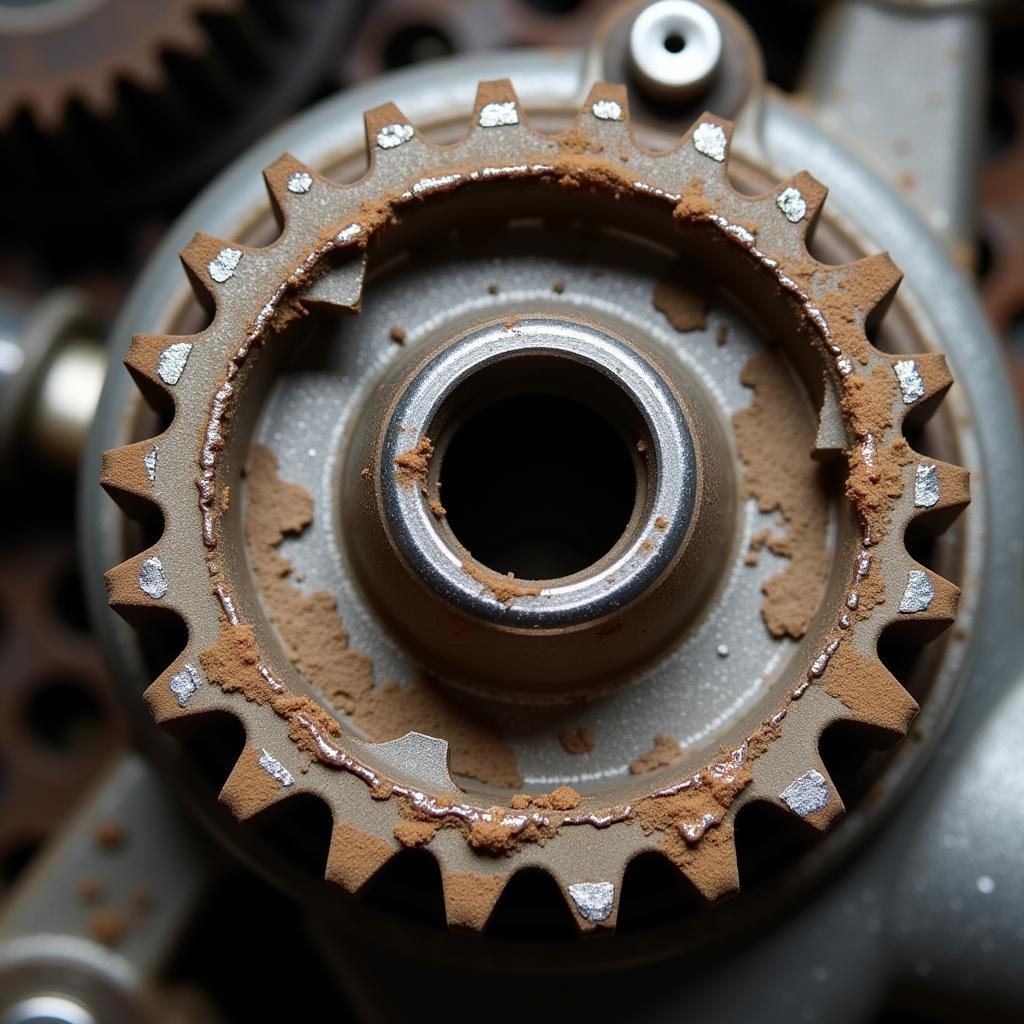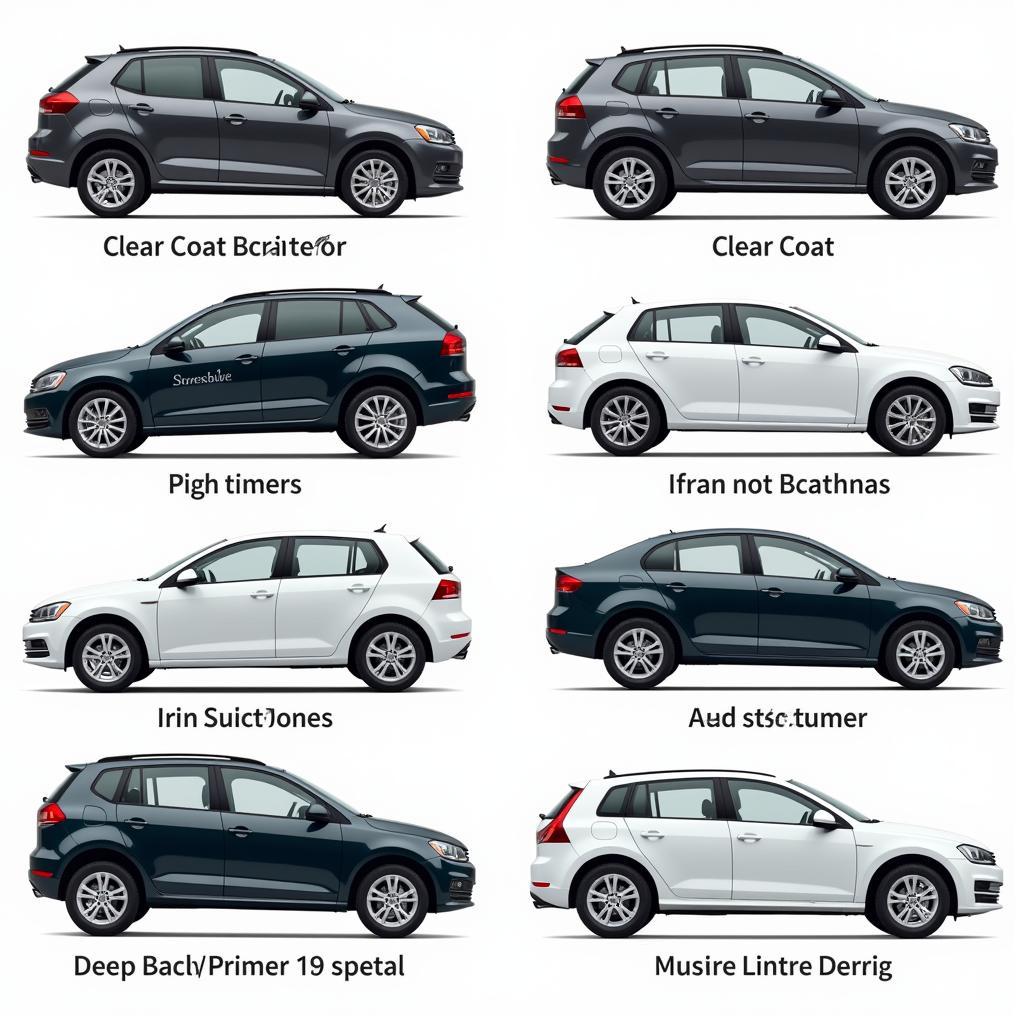Dealing with a grinding noise when you start your car? Fixing Car Starter Tooth Wear might be the solution. This issue can range from a minor inconvenience to a major headache, preventing your car from starting altogether. This guide provides in-depth information on diagnosing, repairing, and preventing car starter tooth wear.
Understanding Car Starter Tooth Wear
Car starter tooth wear occurs when the teeth on the starter motor’s pinion gear or the engine’s flywheel ring gear become worn, chipped, or broken. This damage disrupts the smooth engagement needed for the starter to crank the engine, resulting in grinding noises, slow cranking, or even a complete failure to start.
Causes of Starter Tooth Wear
Several factors contribute to starter tooth wear:
- High Mileage: Normal wear and tear over time.
- Frequent Short Trips: The starter engages more often, accelerating wear.
- Faulty Starter Solenoid: Keeps the pinion gear engaged for too long, grinding against the flywheel.
- Worn Bushings: Misaligns the starter, leading to uneven tooth wear.
 Worn Starter Gear Teeth Close Up
Worn Starter Gear Teeth Close Up
Diagnosing Starter Tooth Wear
The most common symptom is a grinding noise when you turn the key. Other signs include:
- Slow cranking
- Intermittent starting issues
- Clicking noise when turning the key
- No response when turning the key
Pinpointing the Problem
To confirm the diagnosis, a visual inspection is crucial. This often involves removing the starter to examine the pinion gear and flywheel ring gear for damage.
Fixing Car Starter Tooth Wear: Repair Options
Depending on the severity of the damage, you have a few options:
- Replacing the Starter Motor: This is often the most cost-effective solution if the damage is extensive.
- Replacing the Flywheel Ring Gear: A more involved and expensive repair, requiring engine disassembly.
- Replacing the Starter Drive: In some cases, just the starter drive (which includes the pinion gear) needs replacing. This is less expensive than replacing the entire starter.
Fixing Car Starter Tooth Wear: Preventing Future Issues
Proactive maintenance can help prevent future problems. Here are some preventative measures:
- Regular Starter Inspections: During routine maintenance, have a mechanic check the starter for wear.
- Addressing Starting Issues Promptly: Don’t ignore grinding noises or slow cranking, as these can worsen over time.
- Ensuring Proper Starter Installation: Correct alignment and secure mounting prevent unnecessary wear.
“Catching starter issues early can save you from a major headache down the road,” says John Miller, a certified automotive technician with over 20 years of experience. “A simple inspection can prevent costly repairs later.”
Fixing Car Starter Tooth Wear: DIY or Professional Repair?
While some minor starter repairs can be handled by DIY enthusiasts, replacing the starter or flywheel often requires specialized tools and knowledge. Consulting a qualified mechanic is recommended, especially for complex repairs.
“For most car owners, replacing the starter is best left to professionals,” advises Sarah Chen, an electrical engineer specializing in automotive systems. “It’s a relatively complex job that requires specific tools and expertise.”
Conclusion
Fixing car starter tooth wear is crucial for maintaining your car’s reliability. By understanding the causes, symptoms, and repair options, you can address the issue promptly and prevent further damage. Don’t hesitate to reach out for expert assistance if needed. Contact AutoTipPro at +1 (641) 206-8880 or visit our office at 500 N St Mary’s St, San Antonio, TX 78205, United States for personalized support.
FAQ
- What does a grinding noise when starting my car indicate? This is a common symptom of starter tooth wear, indicating that the pinion gear and flywheel are not meshing correctly.
- Can I drive with a worn starter? It’s not advisable. Continuing to drive with a worn starter can damage the flywheel and lead to more expensive repairs.
- How much does it cost to fix car starter tooth wear? The cost varies depending on the repair needed, ranging from a few hundred dollars for a new starter to over a thousand for flywheel replacement.
- How often should I have my starter inspected? It’s a good idea to have your starter checked during routine maintenance, typically every 30,000 miles or so.
- How long does it take to replace a car starter? Replacing a starter typically takes a few hours, depending on the car’s make and model.
- Can I prevent car starter tooth wear? Regular maintenance and promptly addressing starting issues can help prevent excessive wear.
- What is the difference between the starter and the solenoid? The starter motor cranks the engine, while the solenoid engages and disengages the pinion gear with the flywheel.





Leave a Reply